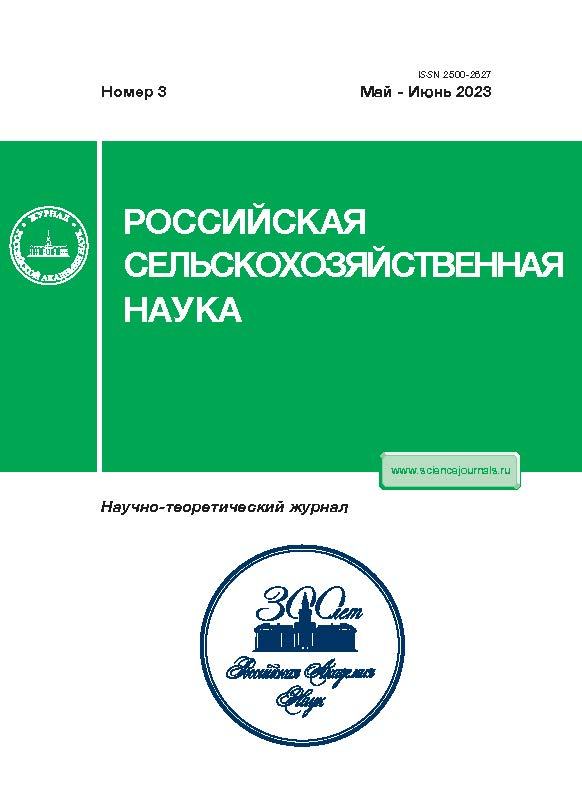Сортовые особенности и приемы повышения продуктивности горчицы белой
- Авторы: Прахова Т.Я1, Таишев Н.Р2
-
Учреждения:
- Федеральный научный центр лубяных культур
- Пензенский государственный аграрный университет
- Выпуск: № 3 (2023)
- Страницы: 19-24
- Раздел: Статьи
- URL: https://journals.eco-vector.com/2500-2627/article/view/657844
- DOI: https://doi.org/10.31857/S2500262723030043
- EDN: https://elibrary.ru/EYXXHC
- ID: 657844
Цитировать
Полный текст
Аннотация
Исследования проводили с целью изучения влияния предпосевной и некорневой обработки микроудобрениями на продуктивность горчицы белой и сравнительной оценки сортов в лесостепи Среднего Поволжья. Работу выполняли в 2020-2022 гг. в Пензенской области. В первом опыте изучали 9 сортов горчицы белой различной селекции, во втором и третьем - эффективность обработки семян и растений микроудобрениями с нормой 1,0 л/т и 1,0 л/га соответственно. Схема опыта включала препараты Гумат +7, Агроверм, Изагри Вита, Мегамикс, Циркон, Цитовит, БлекДжек, Изагри Форс и вариант без обработки. Продуктивность сортов горчицы составляла 1,32…1,61 т/га. Наибольшая в опыте урожайность отмечена у сортов Люция (1,57 т/га) и Светланка (1,61 т/га), максимальное в опыте содержание масла - в семенах сортов Люция и Омега (30,02 и 30,48 % соответственно), минимальное - Пассион и Бракко (25,05 и 26,24 %). Показатель агрономической стабильности, характеризующий их ценность для производства, у всех сортов находился на уровне 78,33…85,82 %. При обработке растений горчицы наиболее эффективными были удобрения Изагри Вита и Агроверм, которые способствовали формированию наибольшего урожая 1,69 и 1,67 т/га. Максимальное в опыте содержание масла (29,72 и 29,70 %) в семенах отмечено при обработке растений препаратами БлекДжек и Изагри Форс. Предпосевная обработка семян микроэлементными удобрениями обеспечивала накопление масла в семенах на уровне 27,75…29,46 %, при 27,87 % в контроле. Наибольшая в опыте урожайность отмечена в вариантах с обработкой семян препаратами Изагри Вита и БлекДжек (1,71 и 1,72 т/га), в которых она на 0,17…0,18 т/га превышала контроль. Некорневая подкормка Цитовитом увеличивала концентрацию эруковой кислоты до 30,1 %, а обработка семян этим препаратом снижала ее до 25,3 %.
Об авторах
Т. Я Прахова
Федеральный научный центр лубяных культур
Email: prakhova.tanya@yandex.ru
442731, Пензенская обл., пос. Лунино
Н. Р Таишев
Пензенский государственный аграрный университет
Email: nurmarat9@mail.ru
440014, Пенза, ул. Ботаническая, 30
Список литературы
- Картамышева Е. В., Лучкина Т. Н., Збраилова Л. П. Экологическая пластичность и стабильность сортов горчицы сарептской селекции ВНИИМК в условиях недостаточного увлажнения Ростовской области // Труды Кубанского государственного аграрного университета. 2019. № 80. С. 139-144.
- Прахова Т. Я., Прахов В. А. Оценка сортов горчицы сарептской в условиях лесостепи Среднего Поволжья // Труды Кубанского государственного аграрного университета. 2020. № 85. С. 203-208.
- Продуктивность сортов льна масличного в зависимости от сроков посева в Нечерноземной зоне России / Д. В. Виноградов, Ю. А. Мажайский, А. В. Новикова и др. // Российская сельскохозяйственная наука. 2021. № 1. С. 17-20.
- Влияние стимуляторов роста и микроудобрений на продуктивность крамбе абиссинской (Crambe Abyssinica H.) / Т. Я. Прахова, А. Н. Кшникаткина, В. А. Прахов и др. // Аграрный научный журнал. 2020. № 6. С. 34-37.
- Наумцева К. В. Некорневые подкормки в агроценозах горчицы белой в условиях Нечерноземной зоны России // Вестник Рязанского государственного агротехнологического университета имени П. А. Костычева. 2021. Т. 13. № 3. С. 62-67.
- Кирюшин В. И. Научно-инновационное обеспечение приоритетов развития сельского хозяйства // Достижения науки и техники АПК. 2019. № 3. С. 5-10.
- Vinogradov D. V., Naumtseva K. V., Lupova E. I. Use of biological fertilizers in white mustard crops in the non-Chernozem zone of Russia // IOP Conf. Series: Earth and Environmental Science. 2019. Vol. 341 Р. 012204. URL: https://www.researchgate.net/publication/337288206 (дата обращения: 13.03.2023).
- Донская М. В., Велкова Н. И., Наумкин В. П. Зернобобовые культуры (чина, вика, горох) в смешанных посевах с горчицей белой //Земледелие. 2019. № 4. С. 25-28.
- Ростова Е. Н. Влияние элементов технологии на засоренность и продуктивность посевов горчицы сарептской (Brassica juncea) // Зерновое хозяйство России. 2021. № 3 (75). С. 75-81.
- Жирных С. С. Семенная продуктивность горчицы белой и сарептской в Удмуртской Республике // Вестник КрасГА У. 2021. № 12 (177). С. 17-24.
- Yesilyurt M. K., Arslan M., Eryilmaz T. Application of response surface methodology for the optimization of biodiesel production from yellow mustard (Sinapis alba L.) seed oil // International journal of green energy. 2019. Vol. 16. No. 1. P. 60-71.
- Тойгильдин А. Л., Подсевалов М. И., Остин В. Н. Перспективы использования масличных культур в севооборотах лесостепной зоны Поволжья // Вестник Ульяновской государственной сельскохозяйственной академии. 2021. № 2 (54). С. 54-61.
- Методика проведения полевых и агротехнических опытов с масличными культурами. Краснодар: ВНИИМК, 2010. 323 с.
- Неттевич Э. Д. Потенциал урожайности рекомендованных для возделывания в Центральном районе РФ сортов яровой пшеницы и ячменя и его реализация в условиях производства // Доклады РАСХН. 2001. № 3. С. 50-55.
- Кильчевский А. В., Хотылева Л. В. Экологическая селекция растений. Минск: Тэхналогiя, 1997. 372 с
Дополнительные файлы









